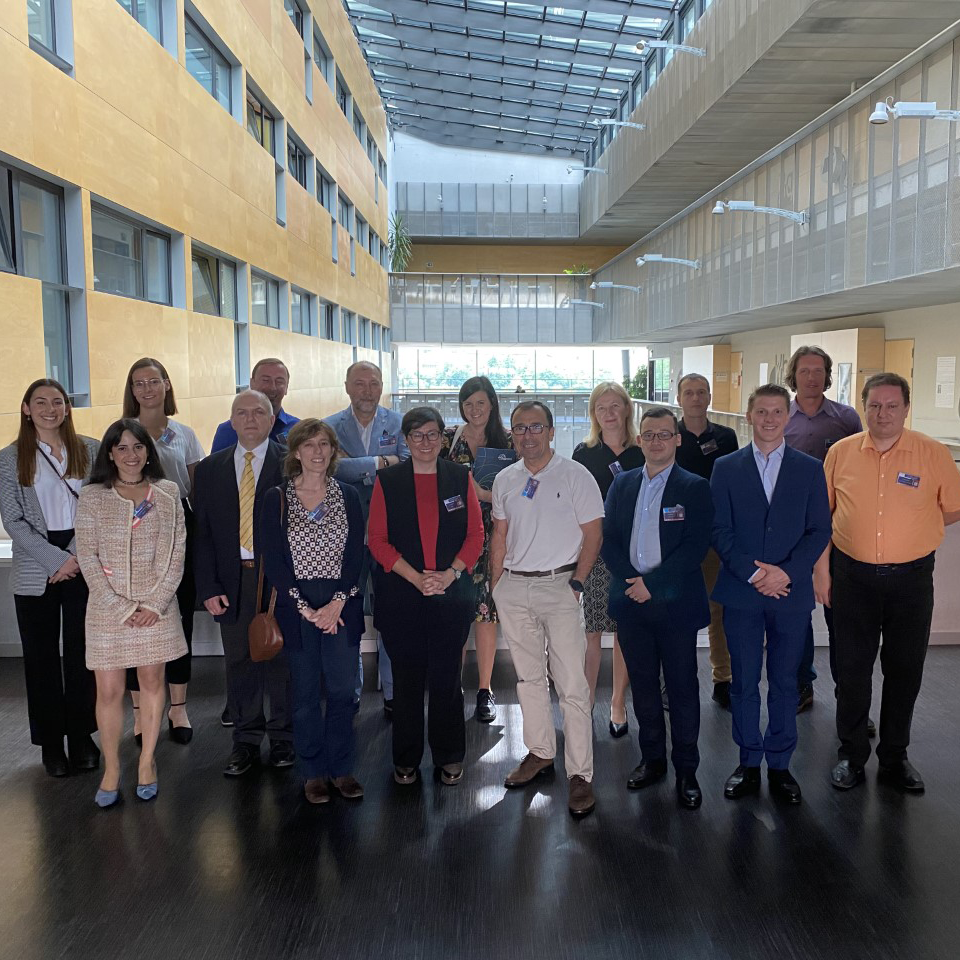The following members of EURADA were present: Regional Innovation Center Ambitious Gabrovo, DURA - Dubrovnik Development Agency, SIMORA, Krapina Zagorje Entrepreneurial Centre, Enterprise Greece, DARINNO - South Great Plain Regional Innovation Agency, Oost NL, Regional Development Agency in Bielsko-Biała, ADR Centru, FUNDECYT-PCTEX, IDEPA, IVACE, and SPRI - Agencia Vasca de Desarrollo Empresarial.
The event, which counted more than 40 people on-site, started with a welcome by Matjaž Fras M.Sc., CEO of STP, and Tamas Gyulai as a representative of EURADA, who gave an overview of DARINNO as well as the importance of being part of networks as EURADA.
After this introduction, we followed with a presentation on best practices of DIH, which started with Muhamed Turkanović, Ph.D, Head of Operations at the Digital Innovation Hub UM who gave an overview of the University of Maribor as a Digital Innovation Hub and the initiatives they are carrying out. The next speaker was Emilija Stojmenova Duh, Ph.D., Head of 4P DIH at the University of Ljubljana, who explained the activities of the University of Ljubljana, its structure, and its initiatives, and took the opportunity to emphasise that, after all, digital transformation is about people foremost. The last speaker of the session was Tamas Gyulai, who presented DARINNO and the importance of being part of European projects for the development of the DIHs. He also presented some projects: TetRRIS, Metabuilding, DIH2 and DIH-World project.
After this, we had the section on DIH2 project where Borut Zrim, Head of External Relations at Technology Park Pomurje, and Matej Borko, M.Sc, CEO of Komunikacije prihodnosti gave an overview of the DIH2 project as well as the benefits that both SMEs and DIHS can find within this project. DIH2’s project main role is to facilitate the connections that enable agile production in factories, where speed and versatility are essential to satisfy customer demand. To this end, they currently bring together a network of 25 Digital Innovation Hubs (DIHs) to generate innovation that maximises productivity and optimises agility in over 300,000 manufacturing SMEs and mid-caps across the European Union.
During the latest session of the day, two round tables were held, the first one being moderated by Borut Zrim where participants tried to find solutions for the challenges gathered in the first meeting of the Digitalisation Working Group in March 2022. The second-round table about regional challenges for digitalisation of SMEs was moderated by Borut Jurišić, from Styrian Technology Park.
The speakers of the first round table were both representatives of EURADA members, Regional Development Agencies: Tomislav Plesec, SIMORA (Croatia), Danitsa Yanakieva, Regional Innovation Centre "Ambitious Gabrovo" (Bulgaria), Ingrid Meijer, Oost NL (Netherlands) and representatives from Digital Innovation Hubs: Tanja Senekovič, Styrian Technology Park (Slovenia), Davorka Moslavac Forjan, ICENT (Croatia).
The first meeting of the Digitalisation Working Group on the 31st of March 2022, was focused on the identification of the main challenges in the implementation of the follow-up funding schemes. RDAs, DIH and RTOs were invited to present the most relevant barriers that they encounter in their respective territories. A set of findings influencing the success of the joint definition of regional support mechanism were brought forward during the discussion such as:
Challenge 1. Guidance for the implementation of regional funds,
Challenge 2. Organisation and coordination of the stakeholder dialogue,
Challenge 3. Skills and knowledge,
Challenge 4. Stable and predictive funding programme schemes,
Challenge 5. Alignment of regional and European funding schemes,
Challenge 6. Follow up schemes for European open calls,
For all those challenges the panelists gave different solutions depending on their context.
For all of them being part of networks is crucial in order to have information related to European funding, European opportunities, and future collaboration, such as EURADA, ERRIN, EEN, I4MS, etc.
To have a strong collaboration with different actors in the regions and the organisations with them is important to understand the needs of the regions and to get to know each other.
Trainings, workshops, and mentoring for the SMEs and stakeholders (national programmes to support start-ups, i.e to encourage and teach unemployed people entrepreneurial skills.
Different programmes which aim to teach students at an early age about digitalisation and the different opportunities related to it. Kinder garden programmes for some of the regions focused on specific fields.
Funding support (brain drain).
Incubation, funding schemes, consultations, brokerage, networking, crowdfunding campaigns,
Having comprehensive support and tailored services for the SMEs and the ecosystem in order to properly understand their specific needs.
Exchange of expertise through thematic events for the SMEs and the relevant actors.
The parallel sessions ended with a joint wrap-up by both round tables. Borut Jurišić, presented the challenges that were shared during the second round table and Borut Zrim presented the solutions that the different RDAs and DIHs presented in the first round table. These parallel sessions were followed by a pitching session in which most EURADA members presented their agencies, DIHs or projects.
EURADA and EURADA members ended the event with a visit to the supercomputer in Maribor, where the centre explained the technical and functional side of its cutting-edge technology.
Should you have any questions about the Digitalisation Working Group or you would like to become a member, do not hesitate to contact Julia COLOMER.
